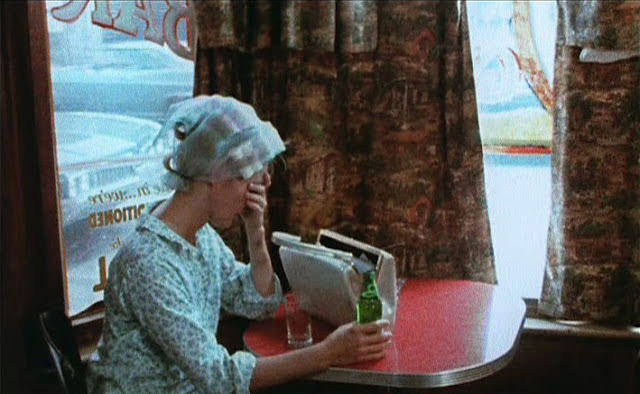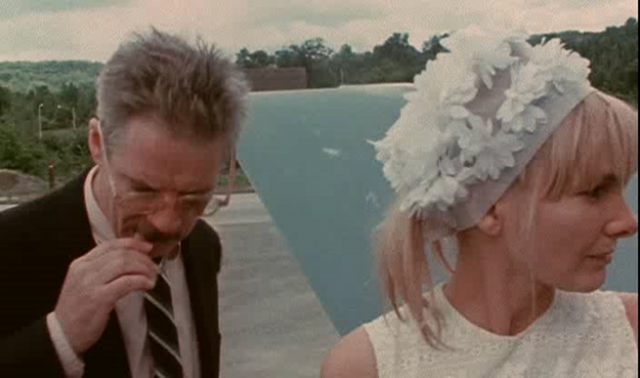
Barbara Loden wrote, directed, produced, and stars in Wanda
WANDA (Barbara Loden, 1970)
Metrograph
7 Ludlow St. between Canal & Hester Sts.
Friday, September 13, 8:20 (with introduction)
Sunday, September 15, 2:50
Thursday, September 19, 3:00
212-660-0312
metrograph.com
“If you don’t want anything, you won’t have anything, and if you don’t have anything, then you’re as good as dead,” Mr. Dennis (Michael Higgins) tells Wanda Goronski (Barbara Loden) in Wanda, which is screening September 13, 15, and 19 in the continuing Metrograph series “One-Timers.” The first theatrical feature written, directed, produced by, and starring an American woman, Wanda is a raw, naturalistic road-trip movie about an emotionally vacant woman who walks through life in a kind of stupor, wandering into situations to avoid being alone yet still trapped in an unrelenting alienation. Loden, who won a 1964 Tony for her portrayal of Maggie in Arthur Miller’s After the Fall — the play was directed on Broadway by Elia Kazan, whom she would marry four years later and remain with through her tragic death in 1980 — doesn’t try to turn Wanda into a feminist antihero, but she does take all the power away from her, making her completely dependent on other people, primarily men, an excellent counterpoint to Loden herself, who has all the power. Staying on her sister’s (Dorothy Shupenes) couch in the middle of Pennsylvania coal country, Wanda is almost zombielike as she slowly heads to court in curlers and a housecoat and lets the judge award custody of her two children to her soon-to-be-ex-husband (Jerome Thier). “I’m just no good,” she mumbles. Broke and apparently with no faith or hope in her future, she proceeds to get involved with some sketchy losers, including Mr. Dennis, who takes her on a minor crime spree that is a far cry from Bonnie and Clyde. All along the way, she rarely has anything of any interest to say to anyone; the only time she speaks clearly and definitively is when she explains that she likes onions on her hamburgers.

Mr. Dennis (Michael Higgins) takes Wanda Goronski (Barbara Loden) for quite a ride in Wanda
Shot in a cinéma vérité style by documentary cinematographer Nicholas T. Proferes, Wanda — named Best Foreign Film at the Venice International Film Festival — is a riveting and infuriating exploration of the death of the American dream as the 1960s come to an end and the country reexamines itself, not necessarily liking what it sees. Apathy competes with melancholy as Wanda is unable and unwilling to take control of her life, dressed in the same white outfit and carrying the same white pocketbook throughout nearly the entire film, but she is more disconsolate than angelic. Much of the film is improvised and most of the characters are portrayed by nonprofessional actors or people who just happened to be in the area, like the scene in which Mr. Dennis and Wanda encounter a family flying a remote-control model airplane. (Higgins would go on to make more than fifty films, including The Conversation, The Stepford Wives, and The Seduction of Joe Tynan.) Coming on the cusp of the women’s liberation movement, Wanda is about a pouty sad-sack who barely ever changes emotion, always wearing the same blank stare. It’s not that she’s promiscuous, adventurous, or even unpredictable; she just is. You desperately want her to take action, to care about something or someone, but it’s just not going to happen. It’s almost as if Loden is setting the groundwork for such future films as Martin Scorsese’s Alice Doesn’t Live Here Anymore and Taxi Driver, which feature such strong, decisive female characters as Alice (Ellen Burstyn) in the former and Iris (Jodie Foster) in the latter, who at least attempt to take matters into their own hands; elements of Wanda can also be found in Aki Kaurismäki’s Match Factory Girl and Chantal Akerman’s Jeanne Dielman, 23, Quai du Commerce, 1080 Bruxelles. Wanda would end up being Loden’s only film as writer and director; she died in 1980 of cancer at the age of forty-eight. The September 13 screening will be introduced by Caryn Coleman, founder of the Future of Film Is Female.
[Mark Rifkin is a Brooklyn-born, Manhattan-based writer and editor; you can follow him on Substack here.]